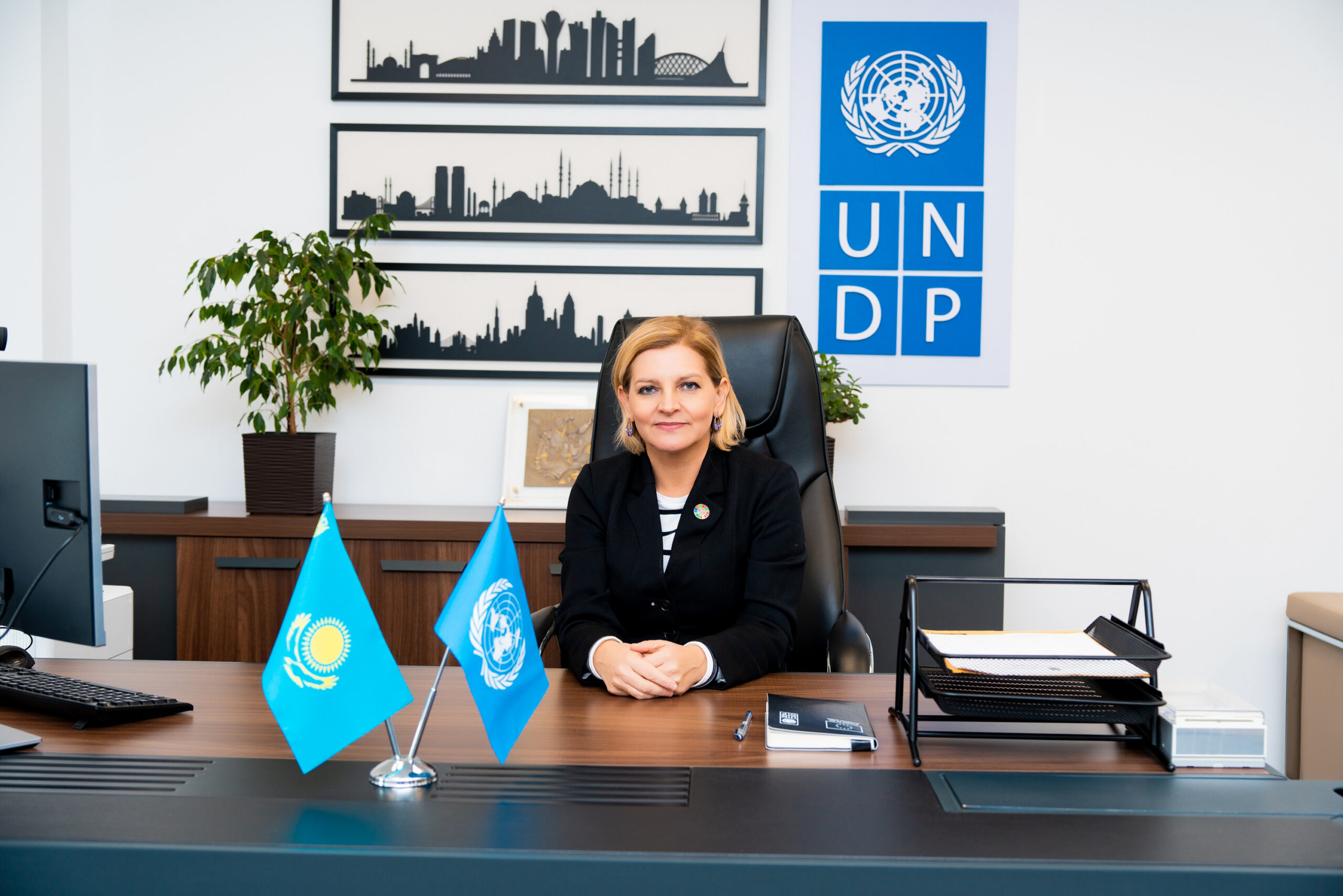Biodiversity loss is one of the triple planetary crises that will determine the viability of our planet in the future. To address this crisis, the United Nations Development Programme (UNDP) made its Nature Pledge to bring the systemic changes needed to halt and reverse biodiversity loss worldwide.

UNDP Resident Representative in Kazakhstan Katarzyna Wawiernia. Photo credit:UNDP Kazakhstan
Recent floods and fires in Kazakhstan have pushed nature to the top of the agenda for politicians and society, reminding of the urgency of the much-needed balance between people and nature.
Today Kazakhstan’s commitment to biodiversity conservation through international cooperation provides a promising pathway toward the implementation of the Kunming-Montreal Global Biodiversity Framework (GBF) also called The Biodiversity Plan.
In 2022, the world, including Kazakhstan, finally agreed on the adoption of the GBF during the 15th Conference of Parties (COP15) to the Convention on Biological Diversity (CBD). This framework sets four overarching goals and targets aimed at halting and reversing biodiversity loss by 2030.
Just as the Paris Agreement was transformative for climate action, the GBF marks a significant milestone for biodiversity conservation.
However, unlike the mandatory revisions of the UNFCCC climate pledges, revisions to National Biodiversity Strategies and Action Plans (NBSAP) under the GBF are voluntary, with no requirement for countries to report every five years on increased ambition. This underscores the need to encourage countries to be transparent and responsible in their biodiversity conservation efforts.
The institutional environment in Kazakhstan is evolving to better support biodiversity conservation and sustainable development.
Recent political reforms, revisions to environmental legislation, and increased civic engagement are creating new opportunities for significant improvements in this area. National strategies are fundamental to state policy implementation across all sectors, including biodiversity and sustainable development.
Kazakhstan has faced challenges in adopting a formal NBSAP. Both the initial document submitted in 1999 and the Concept for the Conservation and Sustainable Use of Biodiversity until 2030 did not receive parliamentary approval.
As a result, the issue of lacking a national strategic document for biodiversity has remained unresolved up until last year when the Ministry of Ecology and Natural Resources of Kazakhstan and UNDP started developing the NBSAP under the project “Global Biodiversity Framework – Early Action Support” funded by Global Environment Facility (GEF).
As part of the BIOFIN initiative, UNDP’s collaboration with the Ministry of Ecology and Natural Resources of Kazakhstan has significantly influenced Kazakhstan’s legislative framework. Key contributions were reflected in the Forest Code, the law On Strictly Protected Natural Areas, and the Environmental Code.
These laws promote biodiversity conservation and sustainable use, fair distribution of natural benefits, compensation for biodiversity losses, voluntary payments for ecosystem services, sustainable ecotourism principles, and methodologies for calculating greenhouse gas emissions and uptake.
As of 2023, Kazakhstan has designated more than 29 million hectares as protected areas, covering 10.77% of the country’s land. In line with the flagship “30 x 30” target (A global target to protect 30% of the planet for nature by 2030), UNDP has supported Kazakhstan in successfully creating eight new protected areas and expanding three existing ones, adding a total of 6.1 million hectares to its conservation lands.
A notable step for the country is the establishment of the country’s first marine protected area in the Caspian Sea, aimed at safeguarding unique species, including the Caspian seal.
Nonetheless, achieving the “30 x 30” target is not easy, and Kazakhstan must explore new ways to avoid green grabbing and ensure the protection of all critical biodiversity areas.
The GBF includes commitments from parties to mobilize at least $200 billion annually for biodiversity conservation, with increased international finance flows from developed to developing countries set to reach $20 billion by 2025 and $30 billion by 2030. While setting substantial funding goals is recognized as a bold step, it falls short of addressing the estimated $700 billion annual biodiversity finance gap.
The GBF calls on parties to significantly increase domestic resource mobilization with the help of national biodiversity finance plans or similar instruments tailored to national needs, priorities, and circumstances.
From 2015 to 2022, funding of biodiversity-related programmes in Kazakhstan amounted to 1,8 billion tenge. According to the BIOFIN Financial Needs Assessment for biodiversity conservation in Kazakhstan the required budget for implementing the national goals was estimated more than $851 million.
UNDP has been committed to conserving the unique nature of Kazakhstan and mobilized more than $15,9 million on projects related to biodiversity conservation from donors such as GEF, Bitfury, and the governments of Germany, Switzerland, and the European Union.
Government expenditures remain the largest source of biodiversity funding, highlighting the importance of maintaining and increasing state investments. However, relying solely on government funding is not sustainable in the long run.
Therefore, encouraging greater financial participation from the private sector and industries is essential to ensure adequate and continuous support for biodiversity initiatives. Private sector and extractive industry contributions are currently minimal, despite the significant environmental damage they cause.
This lack of funding from industries creates a substantial gap in resources needed for biodiversity conservation. This needs to be addressed through legislative regulations and financial incentives to boost contributions from industrial and non-industrial companies.
To combat biodiversity loss, we must transform our economic, financial, and productive systems by valuing natural capital, eliminating harmful subsidies, and investing in a sustainable future. Everyone can help shift from exploiting nature to nurturing it, and inclusive governance is crucial for empowering people to make environmentally responsible choices easily and become part of the Plan.
The author is Katarzyna Wawiernia, the UNDP Resident Representative in Kazakhstan.
